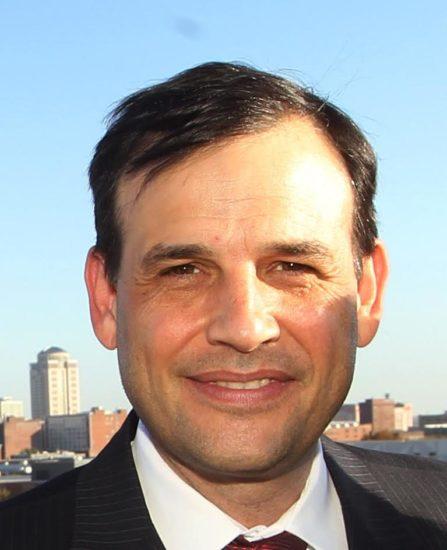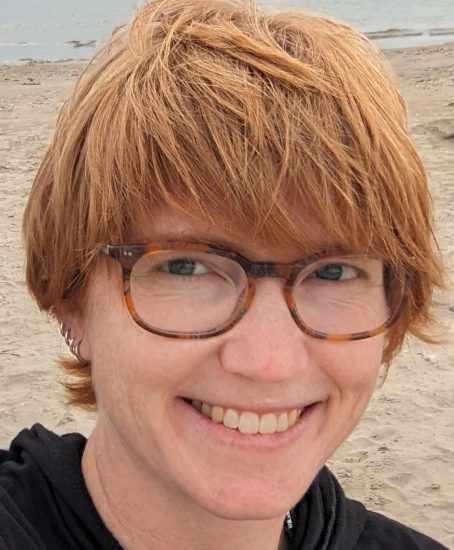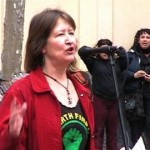Staff & Board of Directors
Staff
Anne Petermann | Co-founder & Executive Director

Anne Petermann co-founded Global Justice Ecology Project in 2003 and she is the International Coordinator of the Campaign to STOP GE Trees, which she also co-founded in 2014. Petermann is also a founding Board Member of the Will Miller Social Justice Lecture Series. She has been involved in movements for forest protection and Indigenous rights since 1991, and the international and national climate justice movements since 2004. She co-founded the Eastern North American Resource Center of the Native Forest Network in 1993, and the original STOP GE Trees Campaign in 2004. She also participated in the founding of the Durban Group for Climate Justice in 2004 in Durban, South Africa, and Climate Justice Now! in 2007 at the Bali, Indonesia UN Climate Conference. Anne has spoken and written extensively about the destructive social and ecological impacts of genetically engineered trees, including the impacts on Indigenous Peoples and forest dependent communities, and the links to cellulosic biofuels made from wood, and other socially and environmentally destructive “false solutions” to climate change. She has also presented on these subjects at capacity-building trainings for Indigenous Peoples, and at conferences including UN Climate Summits, the UN Biodiversity Conferences, the UN Forum on Forests, and the UN Permanent Forum on Indigenous Issues. She is the author of several reports and numerous articles detailing the dangers of genetically engineered trees. She is a contributor to Z Magazine, Counterpunch, Toward Freedom and Daily Kos. She was adopted as an honorary member of the Saint Francis-Sokoki band of the Abenaki in 1992 for her work in support of their struggle for state recognition. In 2000 she received the Wild Nature Award for Activist of the year.
Orin Langelle | Co-founder

In addition to being a co-founder and consultant for GJEP, Orin Langelle is a photojournalist and the Director of Langelle Photography. He also sits on the Steering Committee of the Campaign to STOP GE Trees, which he co-founded in 2014.
Orin Langelle became involved in the movement for social justice in the 1960s in opposition to the Vietnam War. He went on to earn a B.A. in media and communications from Webster University in St. Louis, MO, and trained as a photojournalist at the International Center of Photography in Manhattan under Cornell Capa, brother to renowned war photographer Robert Capa (1977-1978).
In the late 1980s, Langelle helped lead campaigns that stopped logging in the Shawnee National Forest of Southern Illinois, Illinois’ Trail of Tears State Forest, and Saint Louis’ Forest 44.
In 1991 he relocated to Vermont and in 1992 co-founded the international Native Forest Network at their convening conference in Tasmania, Australia. He subsequently co-founded the NFN’s Eastern North American Resource Center in Burlington, VT in June 1993 and organized the group’s First North American Temperate Forest Conference in November of that year. He worked as the Eastern North American NFN Campaign Coordinator from 1993 until 2001.
In the early 90s he actively supported the Abenaki struggle for state recognition in Ndakinna, the Abenaki name for the region known as Vermont. He was adopted as an honorary member of the Saint Francis-Sokoki band of the Abenaki in 1992.
In the summer of 1993 he organized an expedition to James Bay, Quebec to document the Cree resistance to the plans of Hydro-Quebec to dam a series of rivers in Cree territory. (NFN played a key role in a Vermont campaign on the issue, including organizing an international day of action against Hydro-Quebec on their 50th anniversary in April 1994. Langelle traveled through England and Scotland that month speaking and presenting a slide show on that issue. These efforts contributed to Hydro-Quebec abandoning its plans to build new dams in Cree territory.)
Langelle convened the First North American Temperate Forest Conference in November of 1993, which included over 500 forest activists from across North America as well as indigenous representatives from six nations. The conference was organized to build bridges between these communities of activists and encourage greater collaboration. Dr. David Suzuki and Winona LaDuke were the keynote speakers.
In 1995 Langelle helped organize a coalition of groups including hundreds of activists who converged on Burlington, VT to demonstrate against the impending execution of political prisoner Mumia Abu-Jamal during the National Governor’s Association conference. The militant protests, directed at Pennsylvania Governor Thomas Ridge who signed Mumia’s death warrant, spanned five days. Ultimately the death warrant was rescinded and Abu-Jamal is still alive.
In 1994, Langelle began working in solidarity with the indigenous Zapatistas in Chiapas, Mexico who made worldwide headlines when they rose up on New Year’s Day, 1994, the first day of the implementation of the North American Free Trade Agreement (NAFTA). The Zapatistas condemned NAFTA as a death sentence for the Indigenous Peoples of Mexico. He helped organize an action at a Chase Manhattan Bank shareholders meeting that year in response to a leaked memo by a Chase executive calling for the elimination of the Zapatistas. In April of 1995 Langelle organized a climbing team that hung a banner in Washington, DC in support of the Zapatistas during the meetings of the World Bank and IMF.
In June of 1996, Langelle led a delegation to Chiapas to participate in the Zapatista’s First North America Encuentro in La Realidad. Out of this delegation, Langelle facilitated the production of an award-winning film entitled “Lacandona: The Zapatistas and Rainforest of Chiapas, Mexico,” which explored the connections between the destruction of the rainforest and the government’s war on the Zapatistas: including oil, precious hardwoods, and other valuable resources in the jungle that were sought by corporations.
S. Brian Willson, who also attended the encuentro, then asked Orin to look into the destruction of the Bosawas rainforest in Nicaragua. In 1997 Langelle co-organized a delegation to Nicaragua that uncovered unprecedented illegal logging in the Bosawas Reserve. Langelle then organized a solidarity action at the Nicaraguan Embassy in Washington, DC which exposed the illegal logging, and resulted in television and newspaper coverage in Nicaragua. The illegal 150,000 acre logging concession was subsequently cancelled.
In 1998, this emphasis on Central America led Langelle to found ACERCA: Action for Community and Ecology in the Regions of Central America, which followed in the footsteps of EPOCA, with the advice of former EPOCA activists. As Coordinator of ACERCA, Langelle led numerous delegations to Nicaragua, including the first environmental justice delegation to the regions most heavily impacted by Hurricane Mitch, which uncovered that deforestation had worsened the flooding and led to the collapse of a volcano crater lake that submerged entire villages in mud, killing thousands. Greenpeace later confirmed the findings of this delegation.
In 1999, Langelle led a delegation to southeast Mexico that revealed what participants were told was a genetically engineered tree test plot. This led Langelle to write a chapter on GE trees for the book “Redesigning Life? The Worldwide Challenge to Genetic Engineering,” and subsequently to launch the first campaign against genetically engineered trees in June 2000 with a press conference in Boston during protests countering the Biotechnology Industry Organization’s annual conference. The press conference was covered on the front page of the Washington Post.
In January of 2000, Langelle was arrested at the New Hampshire Democratic Campaign headquarters of Al Gore during an action in support of the U’Wa people of Colombia whose land was under threat from Occidental Petroleum—on whose Board Gore’s father served and in which Gore held large quantities of stock. This action was covered nationally and triggered other such actions across the country. The U’wa had threatened mass suicide if drilling occurred. Occidental did not drill on the U’Wa lands.
In April of 2001 Langelle helped coordinate a convergence center in Burlington, VT that was organized to support and train activists on their way to the massive mobilization against the Free Trade Area of the Americas (FTAA) in Quebec City. Dozens of organizations from Vermont participated in this effort and hundreds of activists came through the convergence center. Langelle also organized with others from Buffalo, NY to Jackman, ME in an effort to keep the borders open and was successful. (Canada threatened to close the border.)
In July 2001 Langelle co-organized the first protest against GE trees at an industry conference in Oregon.
In September of 2001 Langelle co-founded a new organization, Action for Social & Ecological Justice, which took over the role previously played by Native Forest Network Eastern North America, and which was founded in response to the broadening focus of the group to include more Latin American and social justice issues.
Over the next two years, Langelle pulled together a coalition of groups to oppose the Plan Puebla Panama; helped organize mobilizations against the World Bank and the Iraq War in Washington, DC; participated in a delegation in support of the defense of the Puerto Rican island of Vieques against the U.S. Naval firing range; and continued to support the efforts of Nicaraguan groups to protect the Nicaraguan rainforest. In addition, Langelle worked with Global Exchange on an emergency delegation to the Montes Azules Biosphere Reserve in Chiapas, Mexico to document and publicize the efforts of Conservation International and the Mexican government to evict Indigenous communities from the forest.
In June of 2003, he helped mobilize the largest ever protest against GE trees at an agricultural ministerial meeting in Sacramento that was preparing for WTO meetings in Cancun, Mexico later in the year.
In September 2003, Langelle co-founded Global Justice Ecology Project and traveled to Cancun, Mexico that month to participate in and document the massive protests against the World Trade Organization. He obtained press credentials for the event that gave him inside access for the demonstrations.
In November 2003, Langelle participated in and documented the mobilization against the Free Trade Area of the Americas in Miami, which was brutally attacked by police. The following summer he participated in and documented the protests at the Democratic National Convention in Boston and the Republican National Convention in New York City, as well as anti-war marches in Washington, DC. Langelle’s photos from these events were widely published.* In 2004 Langelle assembled a photo exhibit entitled “Corporate Globalization vs. Global Justice” which traveled to cities across the U.S. and was viewed by thousands of people.
In January of 2004 Langelle co-founded the STOP GE Trees Campaign, pulling together a meeting with numerous groups from across the country to take unified action to stop the commercialization of genetically engineered trees. Langelle is currently the Co-Coordinator of the STOP GE Trees Campaign.
In 2005 Langelle and GJEP Co-director Anne Petermann formed a partnership with the indigenous Mapuche group Konapewman in Temuco, Chile, to work jointly to stop the commercial development of GE trees in Chile.
Beginning in 2005, Langelle has attended and done media work at various United Nations functions, including the Framework Conventions on Climate Change (Buenos Aires, Argentina; Montreal, Canada; Nairobi, Kenya; Bali, Indonesia and Copenhagen, Denmark) Forum on Forests (New York, NY) and the Conventions on Biological Diversity (Curitiba, Brazil and Bonn, Germany).
In 2007 Langelle attended the World Social Forum in Nairobi, Kenya and did presentations on genetically engineered trees and their relationship to agrofuels and the carbon trading market.
He toured in the spring of 2007 with activists who traveled through The Netherlands, Belgium and France to speak on the dangers of agrofuels. He spoke in a session attended by members of the European Parliament in Brussels, Belgium.
In the summer of 2007, Langelle helped organize several different workshops on agrofuels at the U.S. Social Forum in Atlanta, GA.
In 2007 Langelle helped co-found Climate Justice Now! during the UN Climate Conference in Bali, Indonesia. In 2008 he helped co-found Climate Justice Action in Copenhagen, Denmark and later that year the North American Mobilization for Climate Justice.
In 2008 and 2009, Langelle was the Media Coordinator for the Global Forest Coalition.
After the 2008 World Social Forum in Belem, Brazil, Langelle traveled to the Gran Chaco region of Paraguay where he was asked by the Ayoreo Indigenous People to “share the eye” by taking documentary photographs of one of the local settlements, “Campo Loro” (Parrot Field). In early summer the Ayoreo community received printed photographs of his efforts and put them on display.
Langelle was the only photographer invited by the Ayoreo in recent years to take photographs of their community and lands.
In the fall of 2010, Langelle, along with the Indigenous Environmental Network and Movement Generation organized a meeting of environmental justice, climate justice and community leaders and their allies at the Blue Mountain Center in the Adirondack State Park of New York. This meeting built climate justice strategies for the UN climate negotiations in Cancun, Mexico in 2010 and resulted in the formation of a North American climate justice alliance consisting of front-line, grassroots, community-based environmental justice groups and their allies.
In Cancun, Langelle coordinated a Global Justice Ecology Project media team with the Indigenous Environmental Network, Grassroots Global Justice Alliance, Climate Justice Now!, Global Alliance for Incinerator Alternatives (GAIA), ETC Group, Grassroots Solutions for Climate Justice North America and others, highlighting their messages in dozens of major, international media outlets.
In March 2011, Langelle, along with a writer and two videographers, visited Amador Hernandez in Chiapas, Mexico. This was the first time in many years people from outside of the Lacandon jungle were invited to enter this indigenous territory. The community is threatened with forced relocation due to a deal signed between the state of California and the state of Chiapas, to use the Lacandon jungle to provide carbon offsets for California polluters. Amador Hernandez is refusing to be relocated. Langelle and the investigative team were asked by the community to inform the world that all medical supplies and emergency help has been cut off by the Mexican government in order to force the community out of the region.
Langelle [again] was the first photographer to be invited by that community to take photographs in several years. In May 2011, an exhibit of his photos from the area was displayed in the indigenous community in the Lacandon jungle of Chiapas, Mexico. Additionally there were two shows in Amsterdam, The Netherlands with his images. It was organized by Carbon Trade Watch.
In 2014, Langelle co-founded the ¡Buen Vivir! Gallery for Contemporary Art in Buffalo, NY, where he regularly exhibited his photos documenting social and ecological struggles around the word until 2016. Langelle is now archiving and chronicling his four and a half decades of photos, some of which can be viewed on his website PhotoLangelle.org.
In 2016 Langelle won the Exhibition Award at the prestigious CEPA Gallery in Buffalo, including a solo show at CEPA called Portraits of Struggle that took place there in early 2018.
Langelle’s Photography Statement: I attempt to capture, what noted photographer Henri Cartier-Bresson describes as “the decisive moment.” To me this decisive moment is the instant a visual image is recorded–when light, composition and the subject unite. As a concerned photographer, that image should be of a social value that documents the political essence of the subject; which then inspires the viewer to take action. My goal is to document and expose the reality of injustice–much of which is linked with the struggle for the land–using photographs to educate and change the world, not just to record it.
Langelle uses his media and communications skills to link activists with mainstream and alternative media, journalists and reporters, resulting in hundreds of articles and interviews annually that reach millions of people around the world.*
Langelle was a longtime member of the International Federation of Journalists and the National Writers Union.
* While working with Global Justice Ecology Project, Langelle’s photographs have appeared in numerous publications including L’oeil de la Photographie (Paris), Z Magazine, The Progressive, Christian Science Monitor, Earth Island Journal, Seedling, Spree Magazine and many others. He has contributed to online publications such as World War 4 Report, Toward Freedom, UpsideDown World and others.
Steve Taylor | Press Secretary

Steve Taylor has a Bachelor’s degree in physics, and a Master’s degree in Mathematics and has worked as an instructor at the college and university level. Serving on the negotiating team, Taylor was instrumental in establishing the adjunct union at St. Louis Community College.
Taylor worked as a United States Congressional press secretary from 2000 to 2012. He also worked as a registered lobbyist within the Missouri State Legislature from 1995 to 2000 fighting the expansion of the predatory gambling industry in Missouri.
Taylor won the Leo and Kay Drey Award for Leadership from the Missouri Coalition for the Environment for his founding and work of the Times Beach Action Group, which monitored and exposed fraud surrounding the remediation and incineration of waste from 27 Missouri dioxin sites. Taylor began his environmental work as an activist who fought clear cutting of hardwood stands in the Shawnee National Forest in the early 1990’s.
Heather Lee

Heather Lee has spent over a decade researching, monitoring, and raising awareness about issues related to genetic engineering. She studied Canada’s regulatory and policy-making framework for genetically engineered foods for her undergraduate and graduate theses, obtained through the Faculty of Environment and Resource Studies at the University of Waterloo (Canada). Her work focused on the privatization of governance and increasing lack of transparency and accountability at the Federal level. While in school Heather was on the Toronto Youth Food Policy Council, encouraging youth engagement in shaping policies concerning food sovereignty. Since graduating she co-founded No-More GMOs, a CBAN member group based in Toronto, Ontario, focused on local advocacy and has given talks on GMOs everywhere from community events to international academic conferences. She has collaborated to raise awareness, and counter misinformation, about GMOs with community groups, co-ops, the Organic Council of Ontario, the National Farmers Union, the Canadian Organic Trade Association, and non-GMO focused distributors, farmers, producers, and retailers. She has also been a long-time volunteer with the Canadian Biotechnology Action Network (CBAN) and currently sits on CBAN’s Steering Committee.
Iris Rodriguez

Iris Rodriguez is a multi-disciplinary Artist, Digital Strategist & Creative Director from Yanaguana so-called San Antonio, Texas. Her multimedia work sits at the intersection of culture, art, social and environmental justice, and the digital world. She has participated in a number of regional, national, and international social and environmental justice causes since 2002.
Board of Directors
Nnimmo Bassey

Nnimmo Bassey (Benin City, Nigeria) is director of the ecological think-tank, Health of Mother Earth Foundation (HOMEF) and member steering committee of Oilwatch International. He was chair of Friends of the Earth International (2008-2012) and Executive Director of Nigeria’s Environmental Rights Action (1993-2013). He was a co-recipient of the 2010 Right Livelihood Award also known as the “Alternative Nobel Prize.” In 2012 he received the Rafto Human Rights Award. Bassey has authored books on the environment, architecture and poetry. His books include We Thought it Was Oil, But It was Blood –Poetry (Kraft Books, 2002), I will Not Dance to Your Beat – Poetry (Kraft Books, 2011), To Cook a Continent – Destructive Extraction and the Climate Crisis in Africa (Pambazuka Press, 2012) and Oil Politics – Echoes of Ecological War (Daraja Press, 2016).
Lindsey Gillies | Board Chair

Lindsey Gillies is a Nurse Midwife and Nurse Practitioner with a passion for reproductive and environmental justice. She is an activist, community organizer, and writer. She has served on the GJEP board since 2014. She attended COP 16 in Cancun, Mexico and COP 17 in Durban, South Africa as part of the GJEP delegation. Lindsey currently is the Chair of the Board of Directors for GJEP. She lives in Boston, MA.
Ann Lipsitt | Board Treasurer

Ann Lipsitt is a reading specialist and retired special educator from the Browns Trace middle school in Underhill Vermont. A long-time social justice activist she co-founded the Green Mountain Fund for Popular Struggle with her partner Will Miller. The Fund distributed hundreds of thousands of dollars in support of the movement for social justice and environmental protection in Vermont. Ann is also the founder of the Will Miller Social Justice Lecture Series.
Zahra Moloo

Zahra Moloo is an investigative journalist, documentary filmmaker and researcher from Kenya, based in Montreal. Her work focuses on the extractive industries, land rights, conservation and security. Previously she worked as a reporter and documentary producer for The New Humanitarian (formerly IRIN News) and spent several years covering stories in Kenya, Tanzania, The DRC, Libya and Palestine. Her articles and films have appeared in Al Jazeera, BBC, CBC Docs, Africa is a Country, CCTV’s Faces of Africa, Africa is a Country and the Jacobin. She was a researcher and director with CBC’s Emmy-nominated documentary series Interrupt this Program and has served on the juries for film festivals including the Canadian Screen Awards and the Festival du Nouveau Cinéma. She is currently working on a feature documentary about conservation in Central Africa. She has a BA in History from McGill University and an MA in Broadcast Journalism from City University. Her work can be viewed at: https://zahra-moloo.com/
Alejandra Parra

Alejandra Parra was born in Temuco, Chile where she lives to this day. She is a co-founding member of the Action Network for Environmental Rights (RADA) and is part of Latin American team for the Global Alliance for Incinerator Alternatives. With twenty years of experience in socio-environmental activism, she was part of the successful environmental racism complaint against the State of Chile for the installation of municipal landfills and sewage treatment plants in Mapuche communities in the Araucanía region. Together with RADA, she develops actions to support communities in socio-environmental conflict in the Araucanía region. She also works in coordination with organizations and networks such as the Network for the Defense of the Territories, the Social and Territorial Organizations of Wallmapu, the Alianza Basura Cero Chile, the Global Alliance for Incineration Alternatives GAIA, among others. She is currently part of , and a board member of Global Justice Ecology Project.
Karen Pickett

Karen Pickett has been a grassroots activist for over 45 years, working on issues of forest and species preservation, plastics and resource use, indigenous sovereignty and land back, alliance building between the labor and environmental movements, and civil rights of activists and protesters. She is founder and Coordinator of the Bay Area Coalition for Headwaters and is a Media Consultant for activist campaigns. She leads workshops and classes on movement building and grassroots organizing.
Willard Miller | Board Member in Memoriam

Willard Marshall Miller August 29, 1940 – March 31, 2005 Will was one of our original board members and always will remain on the Global Justice Ecology Board. Willard “Will” Miller, Emeritus Assistant Professor of Philosophy at the University of Vermont, succumbed to lung cancer on March 31 at the age of 64. Images of his hero, the legendary Che Guevara, had always surrounded Will as he worked tirelessly for revolutionary social change. Che’s famous quote, “the true revolutionary is guided by great feelings of love,” was apt for Will, whose love of humanity and the earth led him to dedicate his life to the uplifting of the oppressed. A Karl Marx quote on Will’s website reads, “Philosophers have only interpreted the world, in various ways; the point is to change it!” Will was a revolutionary who fought for academic and political freedom, and the rights of the working class and all inhabitants of the earth who suffer from economic inequities and prejudices. Will understood the connections between politics, war, economics and ecology. Ann Lipsitt, Will’s life partner of 25 years remembers him, “Will set a courageous example in speaking truth to power. Given his extensive knowledge of the workings and ramifications of capitalism and imperialism, he could have become pessimistic, but he showed boundless optimism. With his powerful voice, he was unwavering in the struggle against war and for social justice. He was never afraid to speak his mind, put words into action or place himself ‘on-the-line’ whether before the university trustees, on a picket line, at a barricade or in a congressional office. Will consistently adhered to his strong principles of social justice, progressive reform, and belief in the power of education to effect change. Will gave us a call to action and a vision of a more just society.” Will dropped out of high school to join the army on his 17th birthday. He carried out electronic surveillance missions directed at forces in eastern Europe from 1958 – 1961, an experience he described as highly politicizing. He earned his GED in the Army and passed an exam exempting him from freshman year of college. At the University of Illinois, he received his B.A. in 1966, M.A. in 1968, and Ph.D. in 1969 all in the field of philosophy. Will began his career at UVM in 1969, teaching courses in the philosophy of education, Marxism, radical ecology, and utopian societies, among other topics. Over his 35-year teaching career, Will taught thousands and spoke at numerous demonstrations and rallies. He was an active member of the John Dewey Society, the Society for the Philosophical Study of Marxism, and the Radical Philosophy Association. Will was the sole survivor of a purge of radical philosophers at UVM in 1970. Among those purged was noted scholar and activist Michael Parenti. Parenti points out that while Will was not purged, he continued to be punished for his radical views, “Though he was a popular teacher and published author…he was denied promotion and remained an assistant professor for 35 years with a salary frozen for most of that time at below that of a first-year instructor at UVM. In a word, the treatment accorded him by some administrators and his department chair has been vindictive, petty, and shameful. Given his abilities, I can only conclude that such mistreatment has been politically motivated.” In response to his treatment at the hands of the University, Will set up a web page, which posts the salaries of UVM’s administrators and faculty (www.uvm.edu/~wmiller/). Author, activist, and UVM employee Ron Jacobs comments on Will’s union activity, “a few years ago, the faculty at UVM began a successful drive to unionize. Will was an essential part of that campaign, just as he had been in every union campaign at the university since his hiring. Only four or five years before, he and I were celebrating the victory in a staff union drive at UVM that heralded in the second union in the university’s history. Will’s presence, organizing ability and fervor, and his encyclopedic historical knowledge were instrumental in the success of this campaign-a campaign that provided a voice to the most exploited segment of UVM’s workforce.” He was faculty advisor to many of the radical student organizations at UVM including the Radical Student Union, Union of Concerned Students, The Gadfly student newspaper, and SPARC (Student Political Awareness and Responsibility Collective). He was tireless in his activism and there were few progressive events that didn’t include his incisive, passionate and articulate addresses. Ashley Smith, of the International Socialist Organization remembered one of Will’s Vietnam resistance stories, ” It was the famous march to shut down DC when tens of thousands of activists engaged in civil disobedience throughout the city [Mayday, 1971]. Will joined hundreds of Vermonters to blockade one of the bridges from Alexandria into DC. The army ordered a group of mainly black paratroopers that had just returned from Vietnam to affix bayonets to their weapons and attack the activists. The black paratroopers refused the order and joined the demonstration. In that moment, Will said he got a glimpse of what a socialist revolution would look like in the U.S.” In Will’s own words from his web site: “Remember elections didn’t end the Vietnam War! It was a mass movement of people–students, teachers, parents and children, civil rights activists, union members, anti-war veterans from Vietnam and other periods of recent imperial history, acts of refusal by draft resisters and rebellion by active duty soldiers and finally the continued resistance of the Vietnamese Independence movement. For more than 30 years the Vietnamese fought the imperialism of France, Japan, France again (with U.S. financing) and finally–after preventing an election that Ho Chi Minh would have won overwhelmingly–the 10 year U.S. war on Vietnam was pre-emptively started. Before it was over more than 3 million Vietnamese, Laotians and Cambodians were dead as well as nearly 60,000 Americans. Never again!!!” His powerful articulation of U.S. imperialism and its roots won him many admirers. One of Will’s students was so moved that he donated an inheritance that was used to found the Green Mountain Fund for Popular Struggle in 1989. Over the next 13 years, the foundation contributed $750,000 to support radical social change and environmental efforts in Vermont. Many organizations received their very first grants from the Green Mountain Fund, whose principles of unity state, ” The Green Mountain Fund is committed to revolutionary transformation toward a socialist-feminist society. This society requires the elimination of all oppression… and their basis in patriarchal, capitalist and imperialist structures.” Outside of the University, Will worked as an activist in Vermont Veterans for Peace, Burlington Area Draft and Military Counseling, Vermont Cuba Committee, Haymarket People’s Fund, Committee in Solidarity with the People of El Salvador, Network Opposed to Depleted Uranium Weapons and was on the board of Global Justice Ecology Project. We mourn the loss of this sweet, gentle, generous, compassionate human being with a big heart and boundless faith in the goodness of people. He left us a legacy of inspiration — not to be discouraged but to keep fighting the atrocious ideologies related to war. Will is survived by his wife, Ann Lipsitt, his sister, Barbara Knight of Sebastopol, CA, his in-laws, Lew and Edna Lipsitt of Providence, RI and many, many dear friends and comrades. You can visit www.willmiller.org to read and write about how Will’s life and words have touched so many. A memorial service was held April 24, 2005 in the Unitarian Universalist Church in Burlington. Tax-deductible donations can be made to the Will Miller Social Justice Lecture Series, established in his honor. Checks should be made out to Ann Lipsitt, at 10 Machia Hill Road, Westford, VT 05494, designated for the Lecture Fund. WILL MILLER, PRESENTE!
Soren Ambrose | Board Member in Memoriam

Aziz Choudry | Board Member in Memoriam

Aziz Choudry, a great comrade, scholar-activist and friend to many people across the world, passed away in May 2021. Aziz was a rare, generous, gentle, compassionate and marvellous person and was tireless in fighting for justice throughout his life.
Amongst his many passions, Aziz was a founding board member of the Global Justice Ecology Project, one of the founders of bilaterals.org, and a close friend and collaborator of GRAIN. Aziz was a brilliant thinker, writer, and editor; he wrote and edited numerous books over the years, including ‘Learning Activism: The Intellectual Life of Contemporary Social Movements’ (2015), ‘Activists and the Surveillance State: Learning from Repression’ (2019). He also wrote articles on biopiracy, the privatization of nature by conservation groups like Conservation International, free trade agreements and biotechnology.
Beyond his prolific writing, and all the things he fought for and created, Aziz was a wonderful person. He mentored and supported, both formally and informally, countless young activists, scholars and friends. He had an incredible ability to connect people to each other, enriching their social circles, relationships and collaborations. He was also incredibly funny and a brilliant thinker with a sharp wit and an unfailing analysis of social injustice and capitalism.
There is probably no tribute, no words that can sufficiently do justice to the enormous, incredible person that was Aziz Choudry. His loss has been devastating to many people and to so many movements for justice. He will be dearly missed, and always and forever in our hearts.
You can read another beautiful tribute to Aziz, from our friends at GRAIN.
